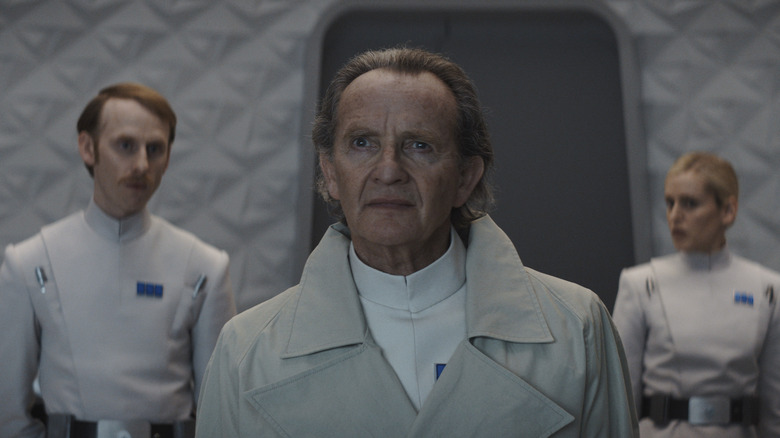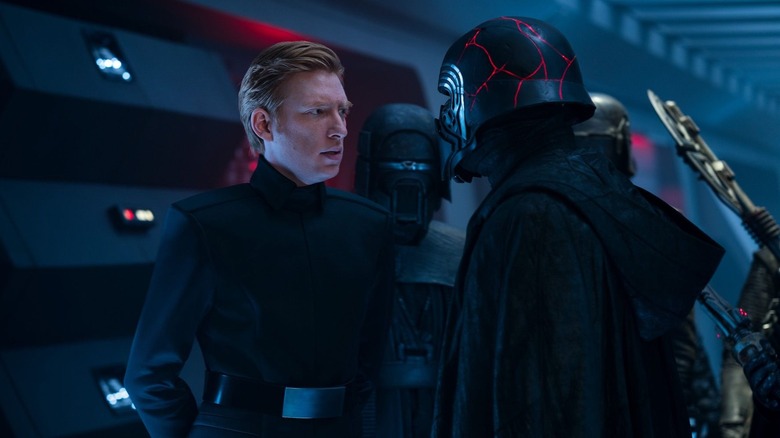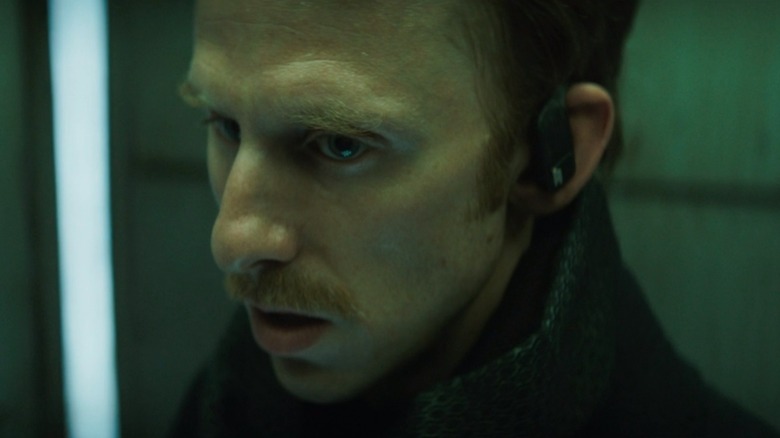Andor Episode 10 Improves On One Of The Star Wars Sequel Trilogy's Worst Missteps
There's only one way out for those avoiding spoilers for "Andor." Turn back now if you haven't watched the latest episode.
The morning after a new episode of a buzzy new show releases is hardly the time to make grand proclamations or sweeping statements about quality. But sometimes, one just has to make an exception. Episode 10 of "Andor" truly does feel like the absolute peak of this shockingly compelling addition to the "Star Wars" franchise. Titled "One Way Out" (you can check out /Film's recap by Bryan Young here), the dark and thrilling hour focused predominantly on Cassian Andor's (Diego Luna) prison break, but it also wrapped up several key narrative threads from this latest mini-arc within the overall series. But one much more minor subplot runs the risk of getting lost in the hype, despite offering one of the best improvements on the recently-concluded sequel trilogy that we've yet seen.
On the face of it, "Andor" and "The Rise of Skywalker" might not seem to have all that much in common. One stands out as one of the most poorly-received installments in the entire franchise, essentially cobbled together on the fly after a last-minute directorial change. The other features all the hallmarks of a singular voice at the helm, using the medium of television to tell a unified, laser-focused, and impressively precise story about what it takes to become a rebel and overthrow an empire.
But this new episode of "Andor" draws one coincidental parallel with the conclusion to the Skywalker Saga: the reveal of a villainous officer betraying their own cause to help a rebellion. Robert Emms' Supervisor Lonnie Jung is revealed to be a spy in "Andor," and in the process, leaves Domhnall Gleeson's spy reveal as General Armitage Hux in "Rise of Skywalker" in the dust.
'I'm the spy'
"Star Wars" is no stranger to the concept of characters switching allegiances after years and years of evil to forge their own paths toward redemption. After all, Darth Vader stands as perhaps the most famous example of this arc. The sequel trilogy gave us this journey on multiple fronts, first with John Boyega's Stormtrooper-turned-rebel Finn in the opening moments of "The Force Awakens" and again with Kylo Ren's sudden turn at the end of "The Rise of Skywalker." But in between both of these bookends, the trilogy-capper gave one other initially villainous character their time to shine ... or tried to, at least.
In a woefully misguided movie full of questionable creative choices, one that arguably sticks out worse than others would have to be the treatment of one General Armitage Hux. Set up in "The Force Awakens" as a virulent fascist, and given several more layers in "The Last Jedi" as a power-hungry rival (both politically and personally) to Kylo Ren, the First Order officer's screen-time is reduced considerably in "The Rise of Skywalker," where he was further marginalized by Richard E. Grant's newly introduced villain General Pryde. The once-fascinating antagonist is saddled with the twist that he's the Resistance spy alluded to earlier in the film, an afterthought of an "arc" that fails to pay off two entire movies of setup
Though his reasoning follows a certain emotional logic — he doesn't care about the Resistance's victory, but Kylo Ren's defeat — his betrayal of the cause he lived and breathed previously, combined with his subsequent death, couldn't help but feel like an anticlimactic end to a villain who held such promise. Simply put, there had to be a better way to construct a double agent storyline.
Fortunately, "Andor" proves how effective one can be.
A double agent done right
Just how easy has "Andor" made it look? A character with an absolute minimum of screen-time, stretched over several episodes with far more attention-grabbing subplots, somehow managed to one-up its counterpart from an entire trilogy of feature films. Where Hux's ultimate conclusion in "The Rise of Skywalker" left something to be desired, the crescendo of Lonnie Jung's appearances in the last episode of "Andor" feels like a dramatic example of a double agent done right.
First appearing in episode 4 as just another faceless officer in a conference room full of Imperial drones, series creator Tony Gilroy has steadily positioned Supervisor Jung into a more central position within the orbits of Supervisor Dedra Meero (Denise Gough) and Major Partagaz (Anton Lesser). Easily dismissed as simply a minor antagonist, however, the character's importance finally comes to light upon the penultimate scene of episode 10.
With the twist that Jung is actually a Rebel sympathizer embedded deep within the heart of the Imperial Security Bureau, his secret rendezvous with Stellan Skarsgård's Luthen Rael suddenly makes everything click. Their terse conversation not only sets the stakes impossibly high for both characters, painfully uncovering everything that they've sacrificed all that they stand to lose for the nascent Rebellion, but it also shows just how potent and effective a double agent storyline can be when placed in the right hands.
With only this one single scene in the spotlight, Jung's palpable desperation allows his internal conflict to be truly felt by viewers, as opposed to Hux, whom we barely get to understand in "The Rise of Skywalker" on any level whatsoever. By making the most of this Rebel officer's dilemma, "Andor" continues its winning streak and proves just how much better the sequel trilogy could've been, too.
"Andor" is streaming on Disney+.


